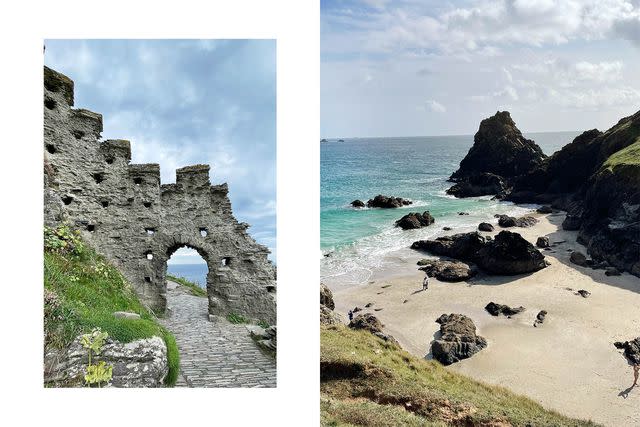I Hiked Part of England's Longest National Trail — and Saw Emerald Cliffs, Tiny Fishing Villages, and Postcard-worthy Beaches Along the Way
I hiked 50 miles looking for England's wild side.

Courtesy of Wilderness England
Standing on the cliff’s edge, with my rain poncho flapping in the wind, snakes of wet hair dangling over my eyes, and waves crashing on jagged rocks far below, I couldn’t help but laugh. This was a side of England — and myself — I had rarely seen. And I welcomed the discovery.
I’m not very brave, and I don’t like heights, but I conveniently forgot all of that when I signed on for a walking tour along the rugged coast of Cornwall with Wilderness England. It’s hard to believe there’s any wilderness left in such a long-settled, people-packed place, so I was especially curious to see what I would find on the seven-day, small-group trek.
My Cornish adventure began with a four-hour ride on the Great Western Railway from London’s Paddington station to Bodmin, where I met up with five other walkers — three solo travelers and one couple, all from the U.S. — along with our local guide. Together, we set out to hopscotch along the South West Coast Path, England’s longest National Trail. Although we didn’t tackle the entire 630-mile journey, we embarked on different sections each day, covering about 50 miles in all.

Laura Beasire
The trail stays within constant sight of the sea for a good reason. In the 19th century, coast guard officers regularly patrolled the path, keeping watch for smugglers hiding goods in secret bays and sea caves. Nowadays, the trail offers a glorious roller-coaster ramble. We lifted our muddy boots to navigate footbridges, boulders, steps, and stiles to the top of craggy headlands and down into secluded coves, over and over again.
As clouds swept across the wide expanse of sky, we added and removed layers of rain gear to suit the changes. I soon stopped fussing and relaxed into whatever weather each day gave us. It was a joy simply to be outdoors from morning to evening, and walking became a moving meditation. We tasted tart berries and marveled at the last blaze of summer wildflowers. Gulls soared overhead, and we spotted seals shining in the water below.
It was easy to pretend we were all alone on the emerald cliffs, but then we’d round a bend and wander into a tiny fishing village, spot a lighthouse, or come across a grazing herd of cattle. Cornwall cherishes a rich trove of myths and folklore, featuring giants, mermaids, and mischief-making piskies, but, disappointingly, we didn’t meet any of those. We did, however, climb to the legendary site of King Arthur’s birth at Tintagel Castle, where there’s still an undeniable aura of majesty.
Other days, we picnicked on Cornish pasties, sprinted through the cobblestone streets of Port Isaac (home to TV’s Doc Martin), surveyed abandoned mines, hopped aboard a boat to reach St. Michael’s Mount, and ambled past surfers in St. Ives. I tiptoed onto postcard-worthy beaches at Kynance Cove and Kennack Sands, ate fish and chips on a bench salvaged from a century-old shipwreck, and watched a lifeboat launch on a training exercise. Each evening, wind-lashed and rain-splattered, our little group tumbled into a cozy inn where a hot meal and a pint at the pub was always waiting. Was it wilderness? Not exactly. But it was exhilarating to walk along the edge.
Related: 8 Picturesque Small Towns in England

Laura Beasire
Wilderness England was founded in 2020 as a sister company to Wilderness Scotland and Wilderness Ireland, offering a range of guided and self-guided walking, cycling, and sailing journeys for small groups (maximum eight to 10 people) in regions including the Cotswolds, Yorkshire, and the Lake District. Tours vary in degree of difficulty, and the company calculates the carbon footprint of each itinerary for easy reference.
The search for wilderness in a modern world can have many meanings, according to Wilderness England’s managing director, Matt Loveland. "Wilderness is finding those special unknown places that not many people even know exist," says Loveland. "But wilderness is also something found within yourself; an inner peace garnered from immersing yourself in nature."
For more Travel & Leisure news, make sure to sign up for our newsletter!
Read the original article on Travel & Leisure.

